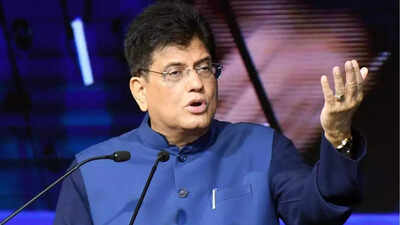Union commerce and industry minister Piyush Goyal has assured that the reduction in Goods and Services Tax (GST) rates will directly benefit the common man, with industries across sectors committing to pass on the gains.Speaking to news agency ANI, Goyal said, “We have received assurance from all sectors of industry, different levels, big and small, have committed that we will pass on the entire benefit to the common man. We are very confident that they will meet our expectations.”
He underlined that the central government trusted its stakeholders just as people trusted Prime Minister Narendra Modi, adding that monitoring mechanisms would ensure compliance.“So I think they will certainly pass it on, and we have sought a commitment from everybody, which we have received. Obviously, there are also mechanisms in place to monitor it, and the consumer affairs department and finance will certainly be involved in this process,” he added.Dismissing concerns about revenue shortfalls, Goyal explained that India’s robust tax collections would offset any impact. “In a collection of over Rs 22 lakh crore in a year, it’s a very small amount… I personally think that the tax collection will actually go up. It may be a few months here or there, but it’ll go up very significantly,” he said.Defending the three-slab GST structure, the minister said it was designed to address diverse societal needs. “I think the naysayers or the people who raise this question are very uninformed about the needs of Indian society. We have a large section of people who need to receive goods at a very low price”, he said. “So we have kept the 5 per cent GST rate, and all the goods of the common man are at 5 per cent. Then there is a set of goods that can afford to have an 18 per cent rate. There aren’t too many now. Those help to subsidise the poor people’s goods. And the ones at 40 per cent are those that I’m certain you or anybody else will not want to make cheaper”, he further added.Highlighting relief in healthcare, Goyal noted that many life-saving drugs had been brought down to zero duty, medical devices had seen duty reductions, and health and life insurance premiums were now exempted from GST.“Health insurance has come down to zero per cent on insurance policies, and life insurance policies are at zero per cent from 18 per cent. So there are a lot of good moves in this,” he said.GST Council on Wednesday approved “GST Reform 2.0,” trimming slabs to 5 per cent and 18 per cent, while taxing luxury and sin goods at 40 per cent. Effective from September 22, the rejig aims to simplify compliance, boost disposable income, and spur demand. Experts cited by news agency PTI said that the changes, combined with income tax cuts and accommodative policy, would create conditions for sustained growth.Analysts also highlighted that the broad-based reduction in GST rates on consumer staples and personal care products would help revive consumption, particularly in the FMCG sector, while lowering inflationary pressures.












